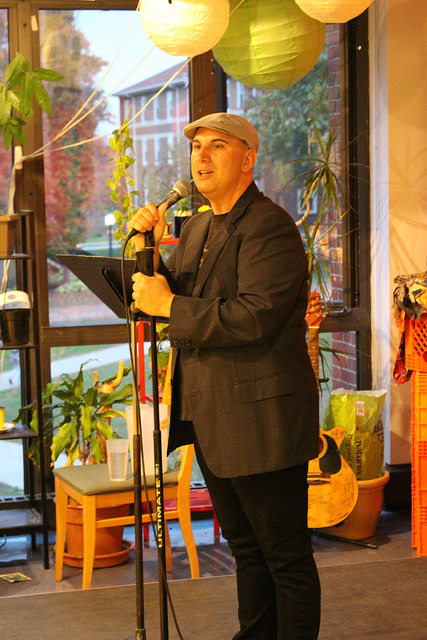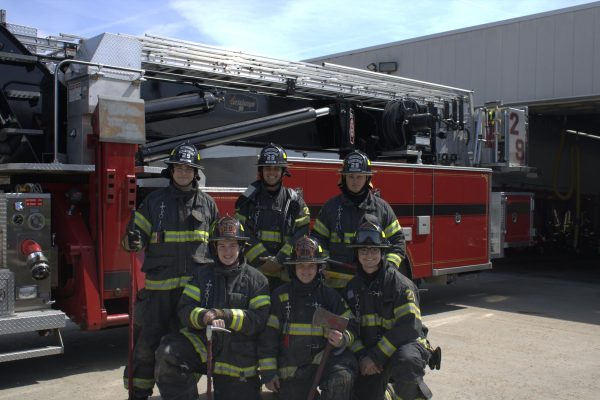Sexuality, mindfulness and climate change
Comedian tackles tough topics with humor, vignettes and a queer perspective
Peterson Toscano, performance artist, gay activist and Bible scholar, visited Allegheny from Tuesday, Oct. 16, to Thursday, Oct. 20, as part of the college’s Year of Mindfulness. During his time on campus, he visited classes, gave a presentation entitled “There’s Something Gay about Climate Change,” and performed his show, “Everything is Connected – An Evening of Stories, Many Weird, Most True.”
Toscano is a full-time public speaker, who is a born-again Christian and openly gay. After becoming Protestant, he spent 17 years in gay conversion therapy trying to change his sexual identity through prayer, Bible studies and therapy. He is a Bible scholar and said that being identified as Christian is his most important identity.
“I thought Jesus could heal me from being gay,” said Toscano. “Hair can be straightened. Gays? Not so much.”
His first presentation, “There’s Something Gay about Climate Change,” was on Tuesday, Oct. 18, in Grounds for Change and was sponsored by both the Year of Mindfulness committee and Gender and Sexuality Alliance. GSA is an alliance that works to support members of the lesbian, gay, bisexual, transgender, queer community on campus.
“We help all of the LGBTQIA+ students on campus … with any problems, particularly with homophobia or transphobia that they have, as well as any issues that they have back home, like if their coming out wasn’t taken well back home, or if they just want a space to chill with other queer students then they have that space,” Noah Thompson, ’19, said.
Thompson is the interim president of GSA, and he said Toscano’s performance brought light to an issue that the organization does not often talk about.
“We obviously talk about queer issues a lot, but we don’t talk about how that intersects with things like climate change,” Thompson said. “It’s two subjects that really don’t intersect that often, so it’s interesting to see what happens when you put those two lenses together.”
During his presentation, Toscano used comedic relief to discuss queer responses to climate change.
“Because [climate change] is funny right? It’s so funny … It’s almost as funny as cancer, and that’s funny and hysterical,” Toscano said.
He explained how he read articles about climate change that, although disturbing and sometimes frightening, never moved him.
It was not until he read an article that stated how a warmer planet would lead to more drought, which would in turn lead to food shortages, migration, political instability and—most importantly for Toscano—crop failures, which would result in global shortages of pasta. He said it was the prospect of a life without pasta that finally moved him.
“We got to do something now—this is serious,” said Toscano. “Yeah, poverty, but pasta?”
Toscano said that since then, he has found many more, less-shallow reasons to be concerned about climate change. He believes it is a human rights issue and said that much of his work involves considering queer responses to climate change.
“I think there’s a role for LGBTQ,” Toscano said. “I think the straight and gender-normative people really need our help.”
During his performance he delivered monologues from five characters who each represented what he considers the five different stages of queer responses to climate change.
He defined stage one as panicking.
“Holy moly, it’s the end of the world as we know it,” said Toscano.
In stage two, Toscano’s character toyed with denial.
“I thought, maybe it’s not so bad,” Toscano said. “Yes, I am concerned about climate change, but maybe it won’t be a catastrophe.”
In stage three, the character was overwhelmed with guilt as he realized that he was part of the problem. Toscano then moved into stage four, where despair descended upon him as he realized that his individual efforts were pathetic in relation to the size of the problem.
Finally, Toscano defined stage five as a wonderful and essential part of the process.
“I found like-minded people,” Toscano said. “We live in extraordinary times. So much uncertainty, danger and fear, but this is not our first rodeo. Our ancestors faced myriad challenges together … they learned an important truth that we are discovering today. We are not alone, we have each other … We shall do the extraordinary.”
Toscano uses his diverse background to form a new perspective on climate change. He said environmentalists and scientists have been leading the conversation, which only looks at the issue from a certain lens. He said their discussion focuses on preserving the planet for their children and grandchildren; but that angle does not always apply to everyone.
“Yeah, that’s good, but I don’t have any of that. I don’t have any personal DNA in the game. What else you got?” Toscano said. “Let me queer this. Let me look at it from a different perspective.”
Toscano said that in looking at a queer response to climate change, he believes that comedy and storytelling are important.
“Queer people—we have a whole history of being funny and … taking serious issues and using comedy and exploring it,” Toscano said.
Toscano used three other characters, Marvin Bloom, Elizabeth Jeremiah and Timothy Meadows, to help him explore climate change and queer responses.
He used the character Marvin Bloom to look at climate denial.
“That’s what’s going on with some of these people who are denying climate change,” Toscano said. “They put all this energy into fighting it and denying this reality. That gives me hope. Because once they go through denial, they’ll go into the other stages … [and] come to the final stage: acceptance.”
Toscano said certain demographics of the LGBTQ communities would be affected by climate change, in particular senior citizens and also the large number of LGBTQ homeless youths.
“You’ve got queer people who are struggling as it is,” Toscano said. “It adds a whole [extra] level of risk in their lives.”
He said a queer response to climate change requires looking at the future in a different way.
“It’s easy to imagine a dystopian, evil, unjust future.” Toscano said. “What does success look like? That takes a lot more work.”
Although he focused on queer responses to climate change, Toscano also explained how other populations will be affected.
“I look at climate change very much as a political issue. When communities are stressed, the marginalized people suffer more. They are already suffering, so they suffer more,” Toscano said. “Basically climate change is racist, sexist, classist—it’s incredibly American in all those ways.”
Associate Dean and Director of the Inclusion, Diversity, Equity, Access and Social Justice Center justin adkins said he enjoyed Toscano’s presentation.
“He does such a good job at taking really big and scary issues … and is able to present them in a way that is accessible,” adkins said. “One of the best things his talks are able to do is focus on the intersections of people’s identities and social justice issues, and not a lot of people are able to do that.”
Toscano performed his one-man show, “Everything is Connected – An Evening of Stories, Many Weird, Most True” in Arter Little Theater on Wednesday, Oct. 19.
This performance was divided into three parts—”Homo-Nomo,” “Transfigurations,” and “Climate Change.” “Homo-Nomo” was about the notion that being gay is bad. “Transfigurations” focused on the act of coming out and Toscano’s trials and tribulations with this process.
“I came to my senses and slowly came out,” Toscano said.
Toscano said he had made the assumption that the gay community was accepting, but he later discovered that he was wrong. He said members of the gay community made derogatory comments about other gay community members.
In “Climate Change,” Toscano brought back Marvin Bloom and touched on a few similar topics from his previous presentation. In both his performances, Toscano encouraged people to put faith in one another and to work toward making the world a better place.
“I think this is something that the world needs. It needs hope, and it needs imagination,” Toscano said. “It’s so hard to be mindful right now, because if you’re aware of the world, it can be so overwhelming. Sometimes I need to practice mindlessness—to binge watch TV shows.”
Toscano said that although the world can be overwhelming, it is important to look for the good.
“During times of crisis, people do extraordinary things … extraordinary, kind, loving, caring things. You see how communities come together to look after each other,” Toscano said. “How can we come up with lasting change that’s not going to hurt communities, but actually foster a better world?”







